|
|
|
Sort Order |
|
|
|
Items / Page
|
|
|
|
|
|
|
| Srl | Item |
| 1 |
ID:
112657


|
|
|
| 2 |
ID:
068150
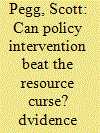

|
|
|
| 3 |
ID:
109115
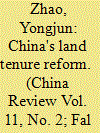

|
|
|
| 4 |
ID:
123499
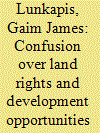

|
|
|
|
|
| Publication |
2013.
|
| Summary/Abstract |
Confusion over land rights issues and opportunities created through communal titles may just be rhetoric to some, but for the poor rural communities, it is a matter of survival. As this paper reveals, this may be due to contradictory interpretations between native communities and state agencies of what constitutes native customary rights. The methods and materials used are based on case studies in the state of Sabah, Malaysia with regard to the policies, programmes and projects that have been implemented in rural areas. This was made possible through interviews with key informants, textual analyses and state documents, and through observations of projects implemented in the rural areas of Sabah. Based on the information gathered, this paper reveals a worrying pattern of state and peoples' interactions over the provision of communal titles and state projects.
|
|
|
|
|
|
|
|
|
|
|
|
|
|
|
|
| 5 |
ID:
064825


|
|
|
| 6 |
ID:
082901
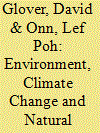

|
|
|
| 7 |
ID:
133285
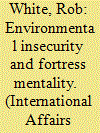

|
|
|
|
|
| Publication |
2014.
|
| Summary/Abstract |
This article explores the political, economic and ecological context within which environmental insecurity emerges and feeds back into a fortress mentality. Shortages of food, water and energy sources are the trigger for nefarious activities involving organized criminal networks, transnational corporations and governments at varying political levels. The consequences of such activities contribute to even more ruthless exploitation of rapidly vanishing natural resources, as well as the further diminishment of air, soil and water quality. These developments, in turn, exacerbate the competitive scramble by individuals, groups and nations for what is left. The accompanying insecurities and vulnerabilities ensure elite and popular support for self-interested 'security'. Accordingly, the 'fortress' is being constructed and reconstructed at individual, local, national and regional levels-as both an attitude of mind and a material reality. Fundamentally, the basis for this fortress mentality is linked to decades of neo-liberal policy and practice that have embedded an individualizing and competitive self-interest that, collectively, is overriding prudent and precautionary policy construction around climate change and environmental degradation. The net result is that security is being built on a platform of state, corporate and organized group wrongdoing and injustice, in many instances with the implied and/or overt consent of relevant publics. Yet, as long as the fortification continues apace, it will contribute to and further exacerbate varying levels of insecurity for all.
|
|
|
|
|
|
|
|
|
|
|
|
|
|
|
|
| 8 |
ID:
052816
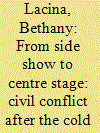

|
|
|
| 9 |
ID:
056949
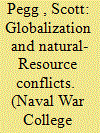

|
|
|
| 10 |
ID:
099612
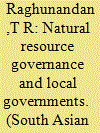

|
|
|
|
|
| Publication |
2010.
|
| Summary/Abstract |
The management of increasingly scarce natural resources is perhaps the most important governance challenge facing humanity today. The designing of appropriate systems for natural resource management by local governments is an interesting policy challenge. This has to be approached objectively and with an unwavering focus on the objective to be achieved, namely, that people require responsible natural resource management for their survival. In doing so, there should be no biases for or against decentralisation. One will have to think out of the box, particularly while designing systems for collaborative action by local governments and other stakeholders. This article analyses the challenges in fostering a sustainable governance of resources by local governments, within the context of their functional responsibilities, and suggests some policy solutions. The article concentrates on the Indian context, while suggesting features of inter-governmental design that comprise the right mix of checks and balances, which is so essential for the good governance of natural resources.
|
|
|
|
|
|
|
|
|
|
|
|
|
|
|
|
| 11 |
ID:
061007
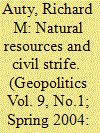

|
|
|
|
|
| Publication |
Spring 2004.
|
| Description |
p29-49
|
| Summary/Abstract |
This article explains why resource-rich countries tend to spawn predatory political states that distort the economy and create four of Collier's conditions for civil strife, namely a growth collapse, low educational attainment, a large cohort of unemployed young males and high resource dependence. Yet, the article also shows that these conditions characterize the resource-rich countries as a group, and most have avoided civil strife. The second part of the study therefore identifies the specific properties of natural resources associated with conflict, namely socio-economic linkages, the ratio of commodity value to weight and relative location. However, this manifestation of the resource curse, like others, is not a deterministic phenomenon so that domestic and global policies can limit resource-driven conflict.
|
|
|
|
|
|
|
|
|
|
|
|
|
|
|
|
| 12 |
ID:
080372
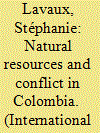

|
|
|
| 13 |
ID:
133426
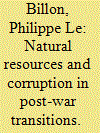

|
|
|
|
|
| Publication |
2014.
|
| Summary/Abstract |
Many 'post-conflict' countries face difficulties in reaping the full benefits of their natural resource wealth for reconstruction and development purposes. This is a major issue given these countries' needs and the risk of seeing 'mismanaged' primary sectors undermine a transition to peace. Bringing together debates about the 'inequality-mistrust-corruption' trap and relationships between natural resources and corruption, this paper suggest that some resource sectors may be more likely to foster inequalities, and thereby increase corruption and distrust, while others are less likely to do so. Reviewing arguments and empirical evidence, I point to the relative importance of transition contexts, stakeholder incentives and resource sector characteristics, and suggest how resource-related corruption may be better understood in relation to trust-building and reconciliation processes.
|
|
|
|
|
|
|
|
|
|
|
|
|
|
|
|
| 14 |
ID:
107022
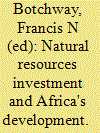

|
|
|
|
|
| Publication |
Cheltenham, Edward Elgar, 2011.
|
| Description |
xii, 529p.
|
| Series |
New horizons in environmental and energy law
|
| Standard Number |
9781848446793, hbk
|
|
|
|
|
|
|
|
|
|
|
|
Copies: C:1/I:0,R:0,Q:0
Circulation
| Accession# | Call# | Current Location | Status | Policy | Location |
| 056193 | 333.715096/BOT 056193 | Main | On Shelf | General | |
|
|
|
|
| 15 |
ID:
169580
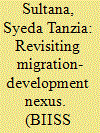

|
|
|
|
|
| Summary/Abstract |
Migration has been intimately linked with development throughout history. International labour migration has contributed to enrich societies and economies of both countries of origin and destination. The academic discussion on the impact of migration on development has varied from time to time. Consequently, literature on migration-development nexus can be classified into three phases. Chronologically, from 1950 to 1960s, scholars viewed migration as beneficial to development. From 1970 to 1980s, literature considered migration to contribute to poverty and underdevelopment in the country of origin. Since 1990s, migration has been seen as a facilitator to development. In effect, to assess the influence of migration on development, existing literature in these phases tends to focus only on economic indicators, e.g., poverty reduction, national income and GDP growth rate, etc. of development. However, the development paradigm since the 1980s focuses on human indicators, e.g., freedom, choice, opportunity and capability of development. It argues that obsession with economic growth and creation of wealth denies the fact that development is ultimately about people. In this respect, the existing literature on migrationdevelopment nexus not only ignores the human face of development but also pushes people from centre to periphery of development. In this context, the paper comes up with an alternative framework to understand the migration-development nexus. It also argues that by creating opportunities, building capabilities and enlarging choices, international labour migration influences development of the origin country at the micro (household) level. Based on these arguments, to revisit migration-development nexus, the paper takes account of successful international labour migrants’ household in Dhaka city of Bangladesh as a case study.
|
|
|
|
|
|
|
|
|
|
|
|
|
|
|
|
| 16 |
ID:
085805
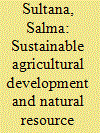

|
|
|
|
|
| Publication |
2008.
|
| Summary/Abstract |
Natural resources are naturally occuring substances that are considered valuable in their relatively unmodified form. The north- east region of India is rich in natural resources. But the natural resources, especially the forest, are facing tremendous pressure due to illegal felling, unscientific human interfaces and lack of proper management plan. As such, proper and sustainable management plan should be taken up for the conservation of the natural resources. The socio-economic prosperity of a region is entirely dependent on nature, the availability of the natural resources and proper use and management of these.
|
|
|
|
|
|
|
|
|
|
|
|
|
|
|
|
|
|
|
|
|